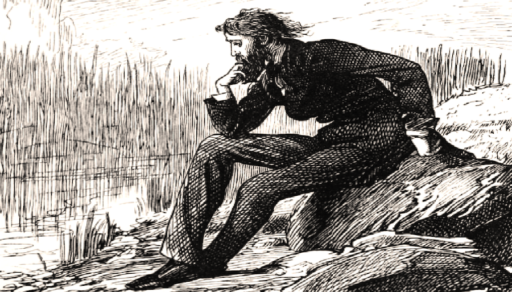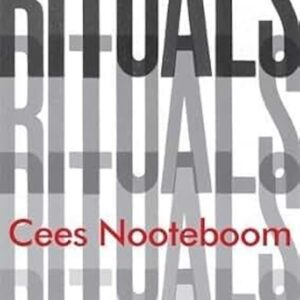A year ago, I wrote about my fraught relationship with the novels of Anthony Trollope. I tried to make clear my appreciation for the prolific Victorian author, contrasting him favorably to his more popular contemporary, Charles Dickens, particularly in his portrayal of women, complexity of minor characters, and the tone of his social satire. What troubled me, however, was Trollope’s recurring use of anti-Jewish stereotypes, tarnishing his otherwise perceptive and highly entertaining novels with swarthy, unscrupulous, and greasy-haired characters feeding their insatiable appetite for ill-gotten cash. It’s an all too common trope in nineteenth century fiction, evidence of an historical epidemic of social intolerance, though Trollope struck me as suffering from an unusually bad case of the disease. A year later, I find myself reassessing that diagnosis.
No, I haven’t decided that anti-Semitism is somehow excusable. Ashamed as I am by the long, ugly legacy of Christians demonizing Jews and likewise horrified by secular anti-Jewish atrocities, Holocaust deniers, and resurgent ethnic supremacists, I’m unable to do that — nor would I wish to. This pernicious bigotry must be called out for what it is. Yet we are all more than the sum of our prejudices and those of our era.
I realize now that I judged Trollope prematurely. I had imagined, having read twelve of his novels, that I could extrapolate from my provisional assessments, intuiting the shape of the remaining thirty-five. In last year’s essay, I supplemented what I knew with critiques of a novel I hadn’t yet read, The Way We Live Now — a mistake I won’t make again. I cheated the reader and all but guaranteed myself embarrassment. I’ve never liked airing my sloppy thinking in public.
It turns out that people — dead novelists included — are complicated. That’s a lesson most of us are doomed to learn more than once. I know I’m capable of holding opinions and convictions others no doubt find contradictory, even offensive. I recognize the same in others, including writers who try to be, as Henry James wrote in The Art of Fiction, one “upon whom nothing is lost.” Ideas held in tension make fertile ground for innovation. Creativity flourishes in paradox, even when distasteful.
Take The Way We Like Now as a test case. Written in response to large financial scandals in the 1870s, the novel is rawer and darker than any in Trollope’s Palliser or Barsetshire series. A thick, juicy steak of a book richly marbled with subplot, its ostensible main character, Augustus Melmotte, is a swindler trading on his reputation as a “great financier” to amass money, power, and prestige. Though rumored to be Jewish and married to “a known Jewess,” his origins and those of his alleged fortune remain obscure. He’s a villain, to be sure, but a three-dimensional one, the worst case in a lineup of mostly gentile Anglo-American fortune seekers, deadbeat nobility, and feckless young adults.
One of Melmotte’s associates, Samuel Cohenlupe, is a mélange of Jewish sterotypes, but his role is blessedly small. Ezekiel Breghert, an aging nouveau riche banker briefly engaged to a husband-hunting shiksa, Georgiana Longestaffe, is described as “fat and greasy,” but behaves the model gentleman in the face of public ostracism and private calumny. Indeed, Miss Longestaffe — among others of her rising generation — calls out her parents’ anti-Semitism as archaic, embarrassing, and socially unacceptable. In this novel, at least, Trollope begins to reach beyond the Victorian caricature, evincing more subtlety and complexity than I gave him credit for.
None of these nuances absolve Trollope of the stain of anti-Semitism. They do, however, blur the edges of what I had thought crisply black and white. In those gray zones, I find last year’s reservations less compelling. Anti-Semitism remains a cancer of the social imagination, and those who acknowledge the Shoah as historical fact recognize its menace. History is a stern, insistent teacher. Yet it’s hard to imagine many educated people today who, having taken the time to read an eight-hundred-page novel, would fail to see its underlying Victorian era prejudices as anything but ethnic slurs. Whether they — or I — are willing to root out vestiges of that intolerance within themselves is another matter.
But there’s a deeper lesson for me in this, the fruit of further pondering in this time of rancor and division on the many ways people arrive at their opinions. Inductive reasoning (drawing probabilistic conclusions from experience) and its cognitive cousin, abductive reasoning (inferring the best provisional explanation from available data) are almost never feats of pure, fact-based logic. Forever tainted by what assumptions the observer brings to the occasion, the mind quietly smears its own lens.
As social psychologist, Mahzarin Banaji, writes, “the mind is a difference-seeking machine,” and though “machine” is a deeply flawed metaphor for brains and the minds they give rise to, her point is spot-on. Implicit bias is a human universal, a species-wide habit of prejudgment uniting bigots with those who sniff them out. If you think yourself exempt, I invite you to test your own implicit biases here. It may prove impossible to rid ourselves of these hidden assumptions, but we can acknowledge their lasting effects on the way we perceive our neighbors.
I’m quick to spot motes in my neighbor’s eye. As for the log in mine, not so much. I have little trouble finding fear, ignorance, and resentment in those whose habits and opinions offend me, especially the ones who, being dead, have no opportunity for rebuttal. I tremble, however, to think how my written opinions and assessments will be judged by future, more “woke” generations. I’ve done a little to redress some entrenched historical injustices, tempering those meager efforts with what I hope others recognize as mercy.
Always in short supply, mercy seems to have fallen off the list of virtues in contemporary social discourse. Yet as Flannery O’Connor, who also struggled with the prejudices of her time, trenchantly warned, “Conviction without experience makes for harshness.” If I’m sympathetic to certain causes deemed “progressive” these days, I’m painfully aware that it was mostly well-intentioned, self-identified American progressives who championed Indian boarding schools, Prohibition, punitive immigration quotas, and eugenic sterilization laws a century or so ago. Perhaps it takes that long for what once seemed really good ideas to prove misguided, even deadly. History is richly endowed with otherwise good people who, by modern standards, went spectacularly wrong.
Thus chastened, I’m readier to bracket those historically-conditioned parts of Trollope that still trouble me, while enjoying — and learning from — his enduring mastery of nuance and scruple, his rollicking good humor, and his patience with human foibles. I’ve learned much from other great writers with whom I’ve also quarreled: Augustine, Dante, T. S. Eliot, Simone Weil. Their failings haven’t kept me from returning to them for more wisdom, deeper insights, further lessons in the hard work of loving imperfect fellow humans — the only kind I know. I’m still a beginner when it comes to that demanding form of love, but I have good teachers, Trollope not least among them.
Brian Volck is a pediatrician and writer living in Baltimore. He is the author of a poetry collection, Flesh Becomes Word, and a memoir, Attending Others: A Doctor’s Education in Bodies and Words. His website is Brianvolck.com





